Chaos in Healthcare System
VerifiedAdded on 2021/05/30
|9
|2155
|336
AI Summary
CHAOS IN THE HEALTHCARE SYSTEM 7 CHAOS IN THE HEALTHCARE SYSTEM 1 Chaos in the healthcare system Name Institution Course Date Chaos in healthcare system Nursing profession is quite demanding and requires passion and determination. Strikes due to low salaries, high cost of services offered to the patients, development and implementation of policies that do not favour health practitioners and poor communication among health organizations are chaos that have affected the healthcare system. Skills for effective nursing leadership As stated by Houston (2012), for 2020, the competence for
Contribute Materials
Your contribution can guide someone’s learning journey. Share your
documents today.
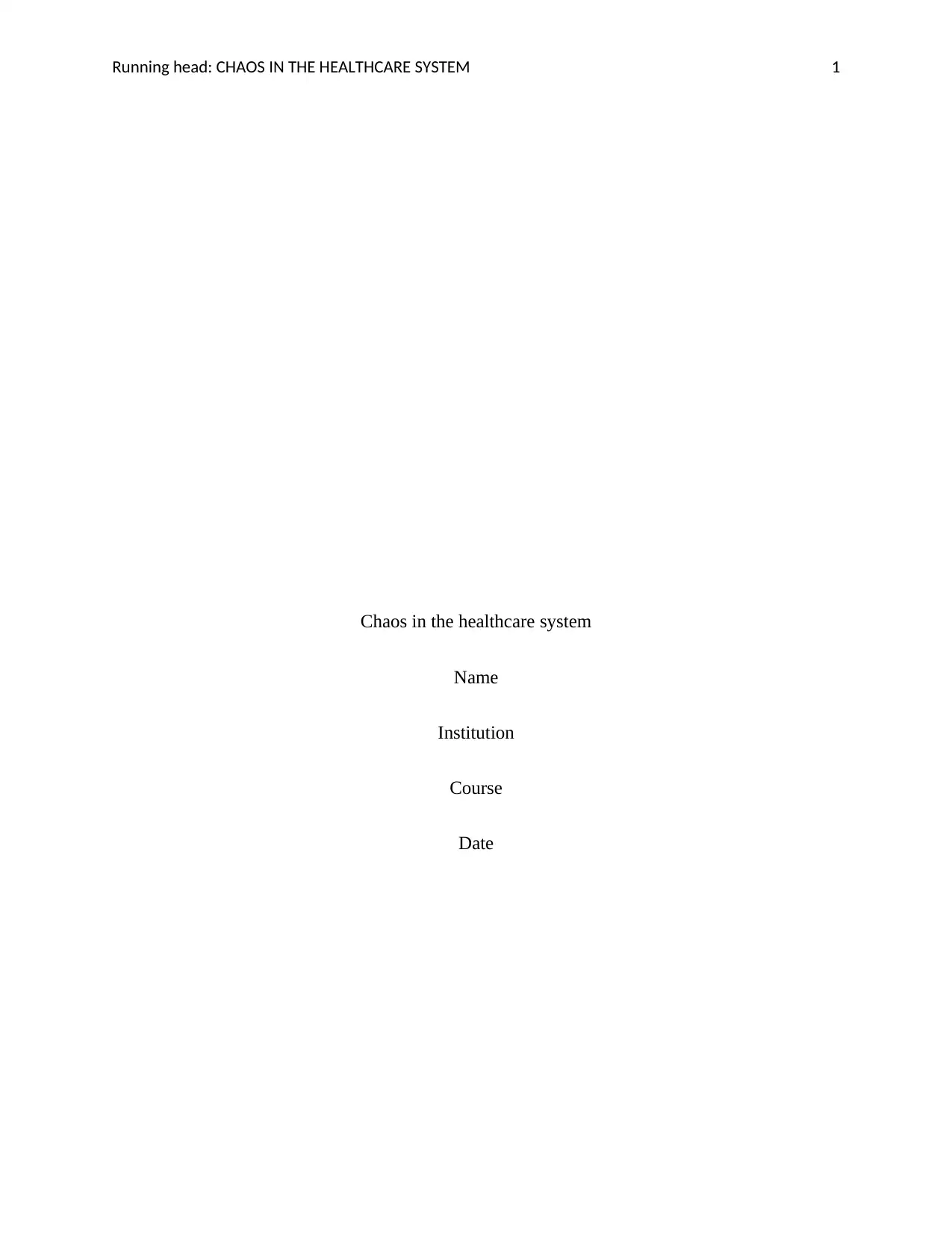
Running head: CHAOS IN THE HEALTHCARE SYSTEM 1
Chaos in the healthcare system
Name
Institution
Course
Date
Chaos in the healthcare system
Name
Institution
Course
Date
Secure Best Marks with AI Grader
Need help grading? Try our AI Grader for instant feedback on your assignments.
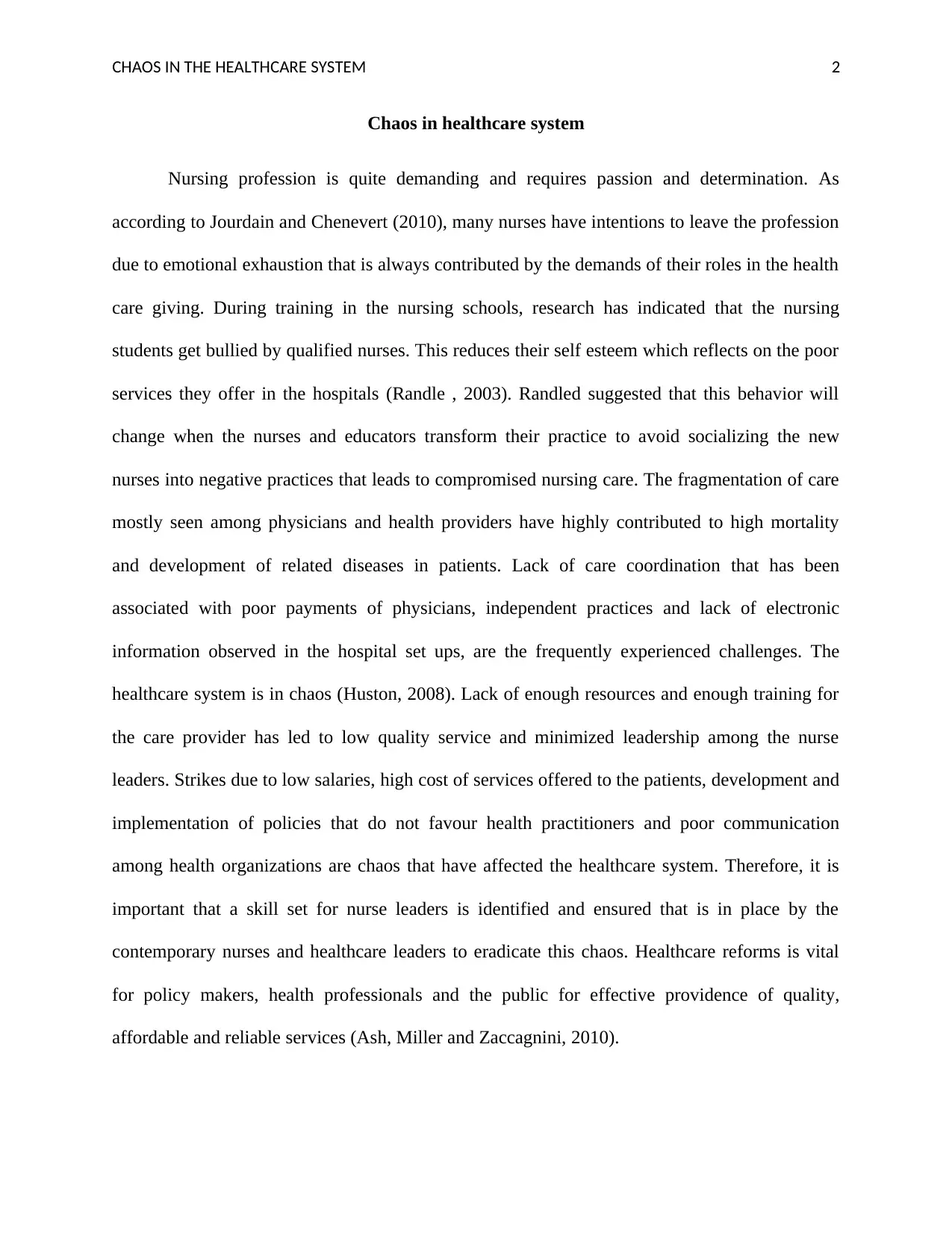
CHAOS IN THE HEALTHCARE SYSTEM 2
Chaos in healthcare system
Nursing profession is quite demanding and requires passion and determination. As
according to Jourdain and Chenevert (2010), many nurses have intentions to leave the profession
due to emotional exhaustion that is always contributed by the demands of their roles in the health
care giving. During training in the nursing schools, research has indicated that the nursing
students get bullied by qualified nurses. This reduces their self esteem which reflects on the poor
services they offer in the hospitals (Randle , 2003). Randled suggested that this behavior will
change when the nurses and educators transform their practice to avoid socializing the new
nurses into negative practices that leads to compromised nursing care. The fragmentation of care
mostly seen among physicians and health providers have highly contributed to high mortality
and development of related diseases in patients. Lack of care coordination that has been
associated with poor payments of physicians, independent practices and lack of electronic
information observed in the hospital set ups, are the frequently experienced challenges. The
healthcare system is in chaos (Huston, 2008). Lack of enough resources and enough training for
the care provider has led to low quality service and minimized leadership among the nurse
leaders. Strikes due to low salaries, high cost of services offered to the patients, development and
implementation of policies that do not favour health practitioners and poor communication
among health organizations are chaos that have affected the healthcare system. Therefore, it is
important that a skill set for nurse leaders is identified and ensured that is in place by the
contemporary nurses and healthcare leaders to eradicate this chaos. Healthcare reforms is vital
for policy makers, health professionals and the public for effective providence of quality,
affordable and reliable services (Ash, Miller and Zaccagnini, 2010).
Chaos in healthcare system
Nursing profession is quite demanding and requires passion and determination. As
according to Jourdain and Chenevert (2010), many nurses have intentions to leave the profession
due to emotional exhaustion that is always contributed by the demands of their roles in the health
care giving. During training in the nursing schools, research has indicated that the nursing
students get bullied by qualified nurses. This reduces their self esteem which reflects on the poor
services they offer in the hospitals (Randle , 2003). Randled suggested that this behavior will
change when the nurses and educators transform their practice to avoid socializing the new
nurses into negative practices that leads to compromised nursing care. The fragmentation of care
mostly seen among physicians and health providers have highly contributed to high mortality
and development of related diseases in patients. Lack of care coordination that has been
associated with poor payments of physicians, independent practices and lack of electronic
information observed in the hospital set ups, are the frequently experienced challenges. The
healthcare system is in chaos (Huston, 2008). Lack of enough resources and enough training for
the care provider has led to low quality service and minimized leadership among the nurse
leaders. Strikes due to low salaries, high cost of services offered to the patients, development and
implementation of policies that do not favour health practitioners and poor communication
among health organizations are chaos that have affected the healthcare system. Therefore, it is
important that a skill set for nurse leaders is identified and ensured that is in place by the
contemporary nurses and healthcare leaders to eradicate this chaos. Healthcare reforms is vital
for policy makers, health professionals and the public for effective providence of quality,
affordable and reliable services (Ash, Miller and Zaccagnini, 2010).
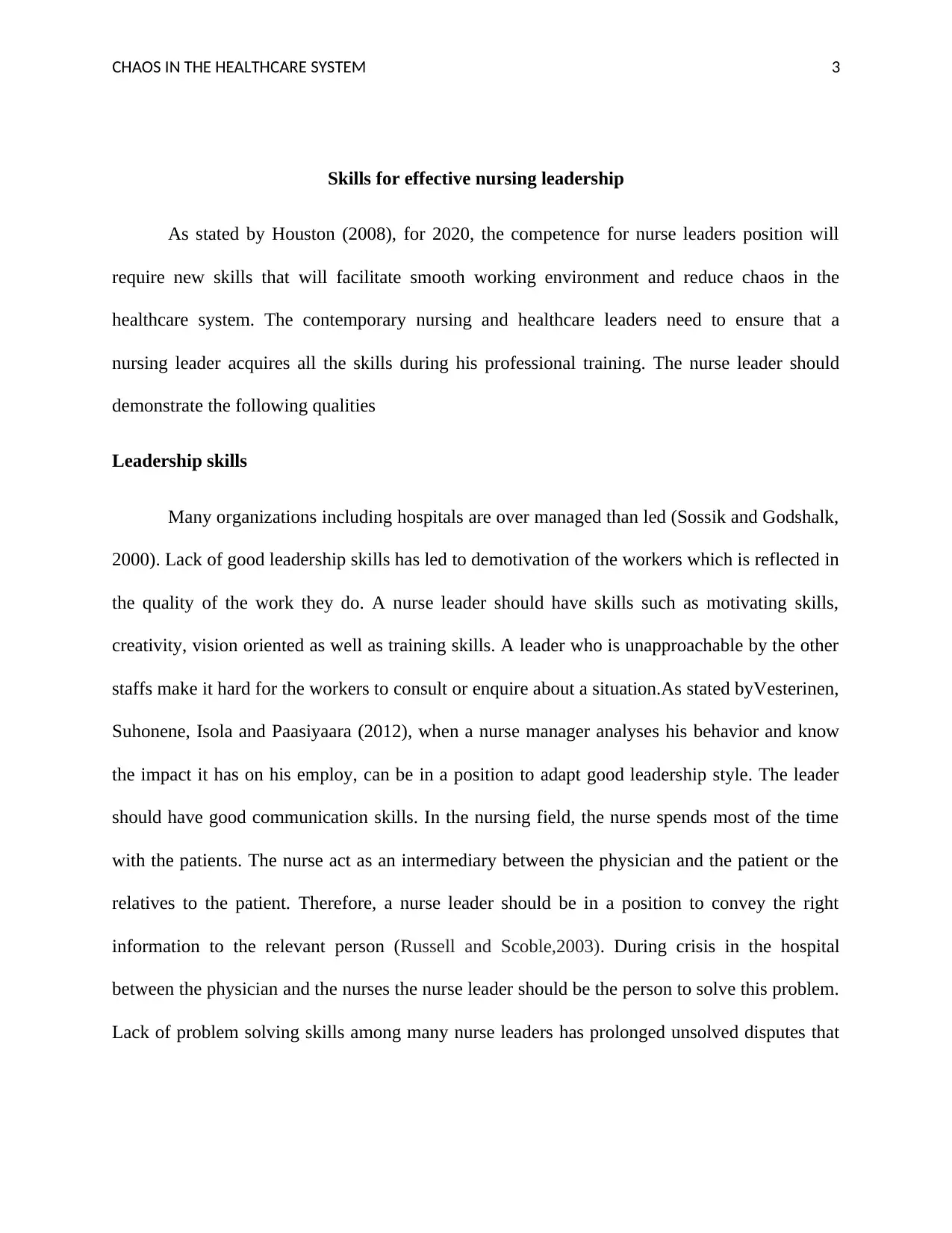
CHAOS IN THE HEALTHCARE SYSTEM 3
Skills for effective nursing leadership
As stated by Houston (2008), for 2020, the competence for nurse leaders position will
require new skills that will facilitate smooth working environment and reduce chaos in the
healthcare system. The contemporary nursing and healthcare leaders need to ensure that a
nursing leader acquires all the skills during his professional training. The nurse leader should
demonstrate the following qualities
Leadership skills
Many organizations including hospitals are over managed than led (Sossik and Godshalk,
2000). Lack of good leadership skills has led to demotivation of the workers which is reflected in
the quality of the work they do. A nurse leader should have skills such as motivating skills,
creativity, vision oriented as well as training skills. A leader who is unapproachable by the other
staffs make it hard for the workers to consult or enquire about a situation.As stated byVesterinen,
Suhonene, Isola and Paasiyaara (2012), when a nurse manager analyses his behavior and know
the impact it has on his employ, can be in a position to adapt good leadership style. The leader
should have good communication skills. In the nursing field, the nurse spends most of the time
with the patients. The nurse act as an intermediary between the physician and the patient or the
relatives to the patient. Therefore, a nurse leader should be in a position to convey the right
information to the relevant person (Russell and Scoble,2003). During crisis in the hospital
between the physician and the nurses the nurse leader should be the person to solve this problem.
Lack of problem solving skills among many nurse leaders has prolonged unsolved disputes that
Skills for effective nursing leadership
As stated by Houston (2008), for 2020, the competence for nurse leaders position will
require new skills that will facilitate smooth working environment and reduce chaos in the
healthcare system. The contemporary nursing and healthcare leaders need to ensure that a
nursing leader acquires all the skills during his professional training. The nurse leader should
demonstrate the following qualities
Leadership skills
Many organizations including hospitals are over managed than led (Sossik and Godshalk,
2000). Lack of good leadership skills has led to demotivation of the workers which is reflected in
the quality of the work they do. A nurse leader should have skills such as motivating skills,
creativity, vision oriented as well as training skills. A leader who is unapproachable by the other
staffs make it hard for the workers to consult or enquire about a situation.As stated byVesterinen,
Suhonene, Isola and Paasiyaara (2012), when a nurse manager analyses his behavior and know
the impact it has on his employ, can be in a position to adapt good leadership style. The leader
should have good communication skills. In the nursing field, the nurse spends most of the time
with the patients. The nurse act as an intermediary between the physician and the patient or the
relatives to the patient. Therefore, a nurse leader should be in a position to convey the right
information to the relevant person (Russell and Scoble,2003). During crisis in the hospital
between the physician and the nurses the nurse leader should be the person to solve this problem.
Lack of problem solving skills among many nurse leaders has prolonged unsolved disputes that
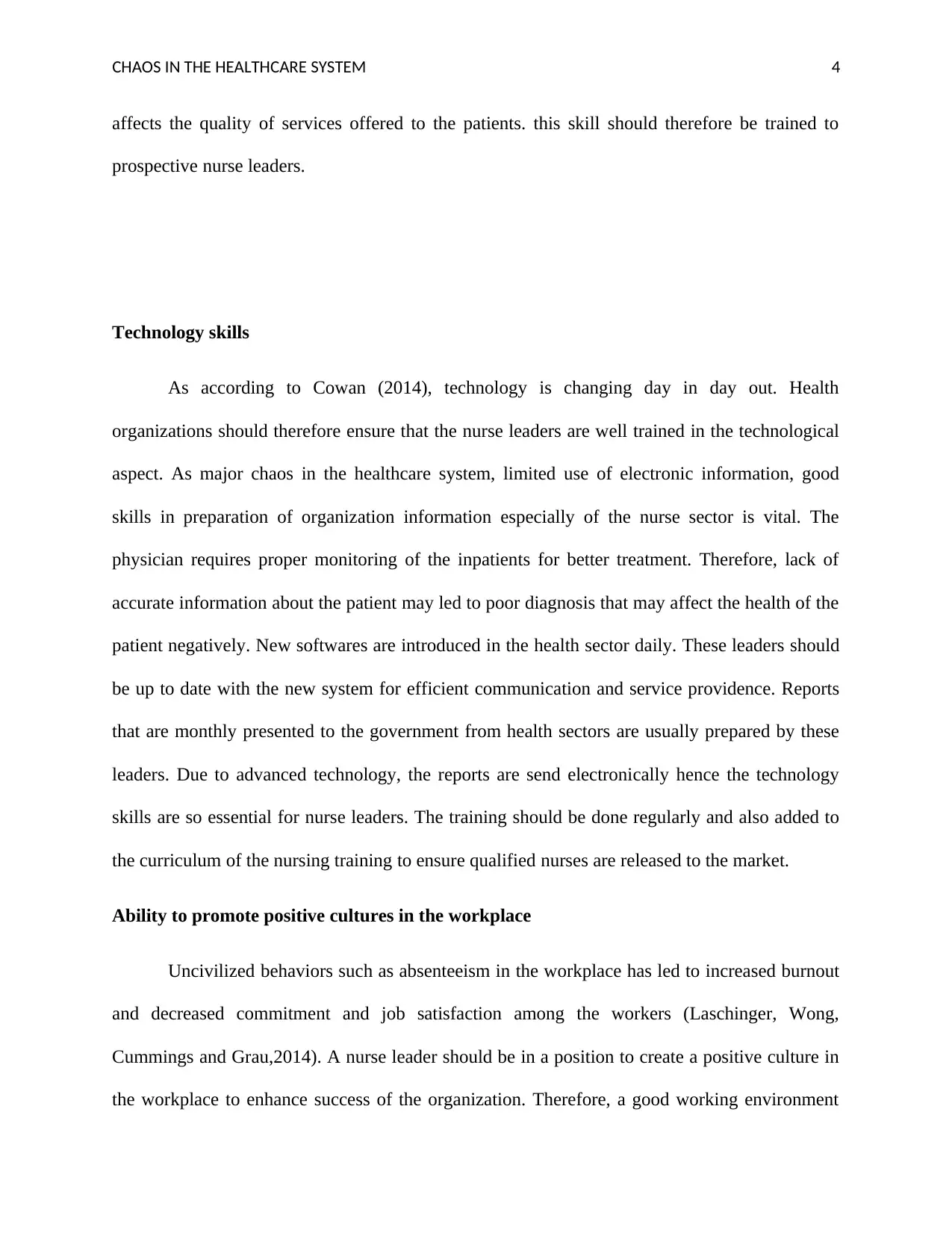
CHAOS IN THE HEALTHCARE SYSTEM 4
affects the quality of services offered to the patients. this skill should therefore be trained to
prospective nurse leaders.
Technology skills
As according to Cowan (2014), technology is changing day in day out. Health
organizations should therefore ensure that the nurse leaders are well trained in the technological
aspect. As major chaos in the healthcare system, limited use of electronic information, good
skills in preparation of organization information especially of the nurse sector is vital. The
physician requires proper monitoring of the inpatients for better treatment. Therefore, lack of
accurate information about the patient may led to poor diagnosis that may affect the health of the
patient negatively. New softwares are introduced in the health sector daily. These leaders should
be up to date with the new system for efficient communication and service providence. Reports
that are monthly presented to the government from health sectors are usually prepared by these
leaders. Due to advanced technology, the reports are send electronically hence the technology
skills are so essential for nurse leaders. The training should be done regularly and also added to
the curriculum of the nursing training to ensure qualified nurses are released to the market.
Ability to promote positive cultures in the workplace
Uncivilized behaviors such as absenteeism in the workplace has led to increased burnout
and decreased commitment and job satisfaction among the workers (Laschinger, Wong,
Cummings and Grau,2014). A nurse leader should be in a position to create a positive culture in
the workplace to enhance success of the organization. Therefore, a good working environment
affects the quality of services offered to the patients. this skill should therefore be trained to
prospective nurse leaders.
Technology skills
As according to Cowan (2014), technology is changing day in day out. Health
organizations should therefore ensure that the nurse leaders are well trained in the technological
aspect. As major chaos in the healthcare system, limited use of electronic information, good
skills in preparation of organization information especially of the nurse sector is vital. The
physician requires proper monitoring of the inpatients for better treatment. Therefore, lack of
accurate information about the patient may led to poor diagnosis that may affect the health of the
patient negatively. New softwares are introduced in the health sector daily. These leaders should
be up to date with the new system for efficient communication and service providence. Reports
that are monthly presented to the government from health sectors are usually prepared by these
leaders. Due to advanced technology, the reports are send electronically hence the technology
skills are so essential for nurse leaders. The training should be done regularly and also added to
the curriculum of the nursing training to ensure qualified nurses are released to the market.
Ability to promote positive cultures in the workplace
Uncivilized behaviors such as absenteeism in the workplace has led to increased burnout
and decreased commitment and job satisfaction among the workers (Laschinger, Wong,
Cummings and Grau,2014). A nurse leader should be in a position to create a positive culture in
the workplace to enhance success of the organization. Therefore, a good working environment
Secure Best Marks with AI Grader
Need help grading? Try our AI Grader for instant feedback on your assignments.
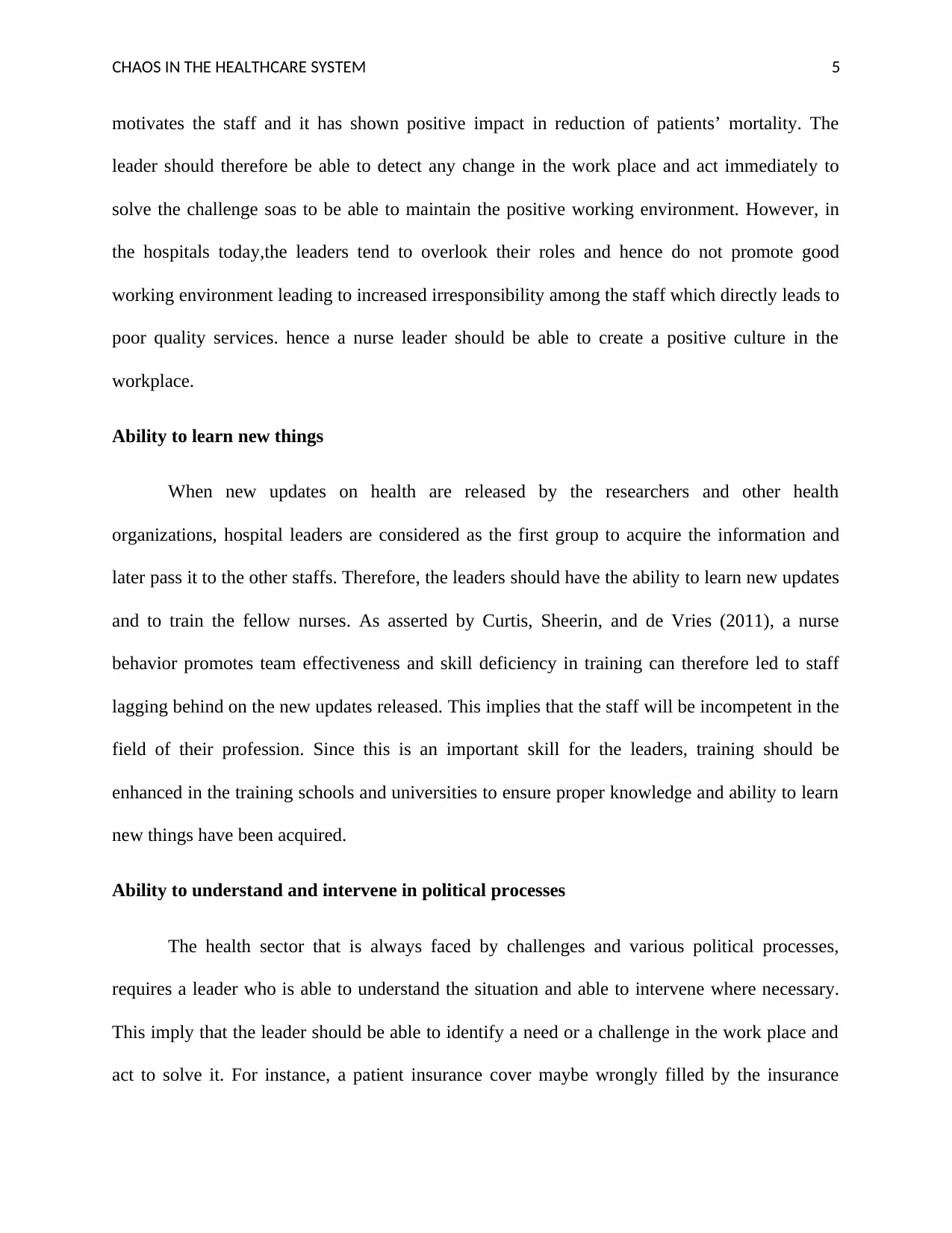
CHAOS IN THE HEALTHCARE SYSTEM 5
motivates the staff and it has shown positive impact in reduction of patients’ mortality. The
leader should therefore be able to detect any change in the work place and act immediately to
solve the challenge soas to be able to maintain the positive working environment. However, in
the hospitals today,the leaders tend to overlook their roles and hence do not promote good
working environment leading to increased irresponsibility among the staff which directly leads to
poor quality services. hence a nurse leader should be able to create a positive culture in the
workplace.
Ability to learn new things
When new updates on health are released by the researchers and other health
organizations, hospital leaders are considered as the first group to acquire the information and
later pass it to the other staffs. Therefore, the leaders should have the ability to learn new updates
and to train the fellow nurses. As asserted by Curtis, Sheerin, and de Vries (2011), a nurse
behavior promotes team effectiveness and skill deficiency in training can therefore led to staff
lagging behind on the new updates released. This implies that the staff will be incompetent in the
field of their profession. Since this is an important skill for the leaders, training should be
enhanced in the training schools and universities to ensure proper knowledge and ability to learn
new things have been acquired.
Ability to understand and intervene in political processes
The health sector that is always faced by challenges and various political processes,
requires a leader who is able to understand the situation and able to intervene where necessary.
This imply that the leader should be able to identify a need or a challenge in the work place and
act to solve it. For instance, a patient insurance cover maybe wrongly filled by the insurance
motivates the staff and it has shown positive impact in reduction of patients’ mortality. The
leader should therefore be able to detect any change in the work place and act immediately to
solve the challenge soas to be able to maintain the positive working environment. However, in
the hospitals today,the leaders tend to overlook their roles and hence do not promote good
working environment leading to increased irresponsibility among the staff which directly leads to
poor quality services. hence a nurse leader should be able to create a positive culture in the
workplace.
Ability to learn new things
When new updates on health are released by the researchers and other health
organizations, hospital leaders are considered as the first group to acquire the information and
later pass it to the other staffs. Therefore, the leaders should have the ability to learn new updates
and to train the fellow nurses. As asserted by Curtis, Sheerin, and de Vries (2011), a nurse
behavior promotes team effectiveness and skill deficiency in training can therefore led to staff
lagging behind on the new updates released. This implies that the staff will be incompetent in the
field of their profession. Since this is an important skill for the leaders, training should be
enhanced in the training schools and universities to ensure proper knowledge and ability to learn
new things have been acquired.
Ability to understand and intervene in political processes
The health sector that is always faced by challenges and various political processes,
requires a leader who is able to understand the situation and able to intervene where necessary.
This imply that the leader should be able to identify a need or a challenge in the work place and
act to solve it. For instance, a patient insurance cover maybe wrongly filled by the insurance
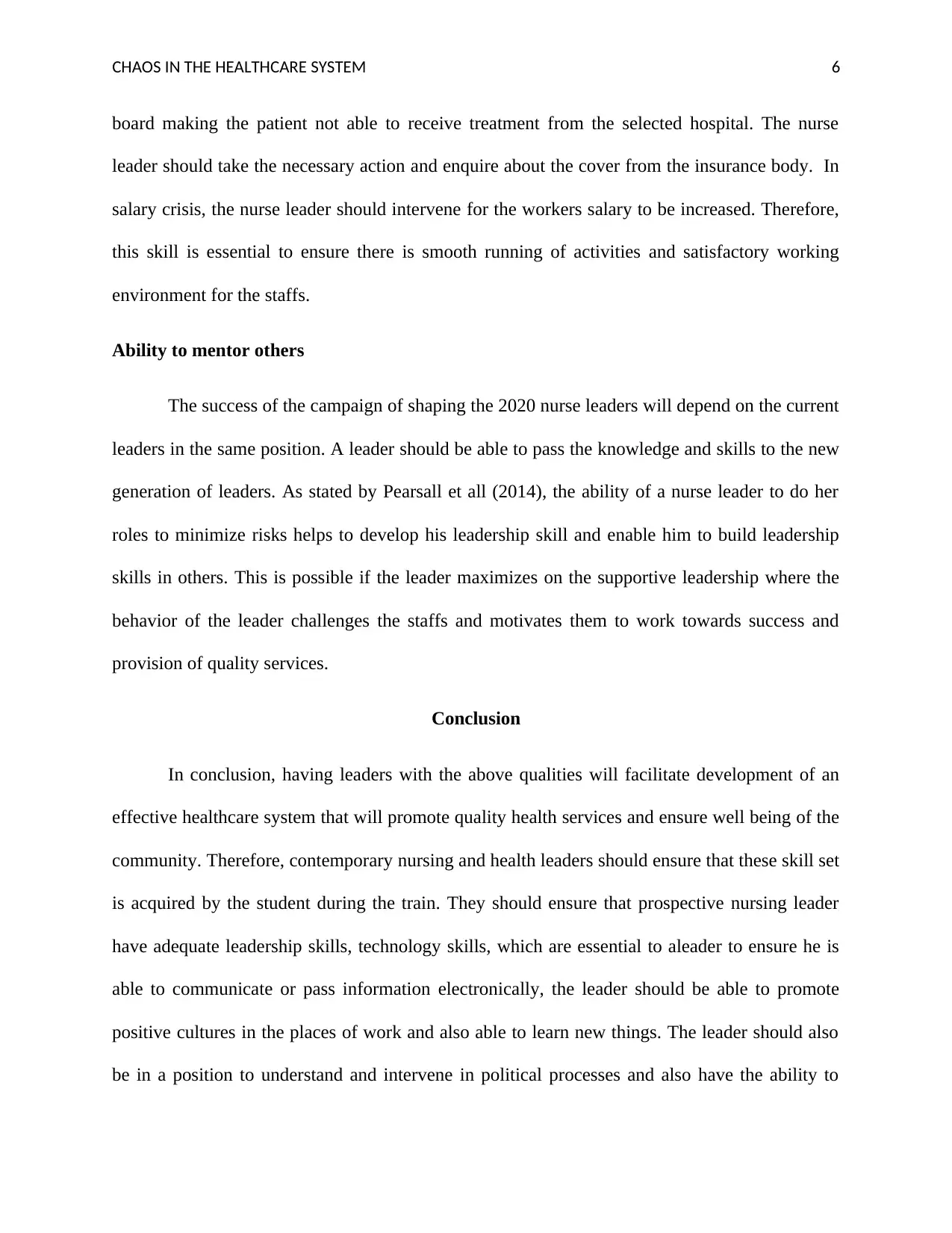
CHAOS IN THE HEALTHCARE SYSTEM 6
board making the patient not able to receive treatment from the selected hospital. The nurse
leader should take the necessary action and enquire about the cover from the insurance body. In
salary crisis, the nurse leader should intervene for the workers salary to be increased. Therefore,
this skill is essential to ensure there is smooth running of activities and satisfactory working
environment for the staffs.
Ability to mentor others
The success of the campaign of shaping the 2020 nurse leaders will depend on the current
leaders in the same position. A leader should be able to pass the knowledge and skills to the new
generation of leaders. As stated by Pearsall et all (2014), the ability of a nurse leader to do her
roles to minimize risks helps to develop his leadership skill and enable him to build leadership
skills in others. This is possible if the leader maximizes on the supportive leadership where the
behavior of the leader challenges the staffs and motivates them to work towards success and
provision of quality services.
Conclusion
In conclusion, having leaders with the above qualities will facilitate development of an
effective healthcare system that will promote quality health services and ensure well being of the
community. Therefore, contemporary nursing and health leaders should ensure that these skill set
is acquired by the student during the train. They should ensure that prospective nursing leader
have adequate leadership skills, technology skills, which are essential to aleader to ensure he is
able to communicate or pass information electronically, the leader should be able to promote
positive cultures in the places of work and also able to learn new things. The leader should also
be in a position to understand and intervene in political processes and also have the ability to
board making the patient not able to receive treatment from the selected hospital. The nurse
leader should take the necessary action and enquire about the cover from the insurance body. In
salary crisis, the nurse leader should intervene for the workers salary to be increased. Therefore,
this skill is essential to ensure there is smooth running of activities and satisfactory working
environment for the staffs.
Ability to mentor others
The success of the campaign of shaping the 2020 nurse leaders will depend on the current
leaders in the same position. A leader should be able to pass the knowledge and skills to the new
generation of leaders. As stated by Pearsall et all (2014), the ability of a nurse leader to do her
roles to minimize risks helps to develop his leadership skill and enable him to build leadership
skills in others. This is possible if the leader maximizes on the supportive leadership where the
behavior of the leader challenges the staffs and motivates them to work towards success and
provision of quality services.
Conclusion
In conclusion, having leaders with the above qualities will facilitate development of an
effective healthcare system that will promote quality health services and ensure well being of the
community. Therefore, contemporary nursing and health leaders should ensure that these skill set
is acquired by the student during the train. They should ensure that prospective nursing leader
have adequate leadership skills, technology skills, which are essential to aleader to ensure he is
able to communicate or pass information electronically, the leader should be able to promote
positive cultures in the places of work and also able to learn new things. The leader should also
be in a position to understand and intervene in political processes and also have the ability to
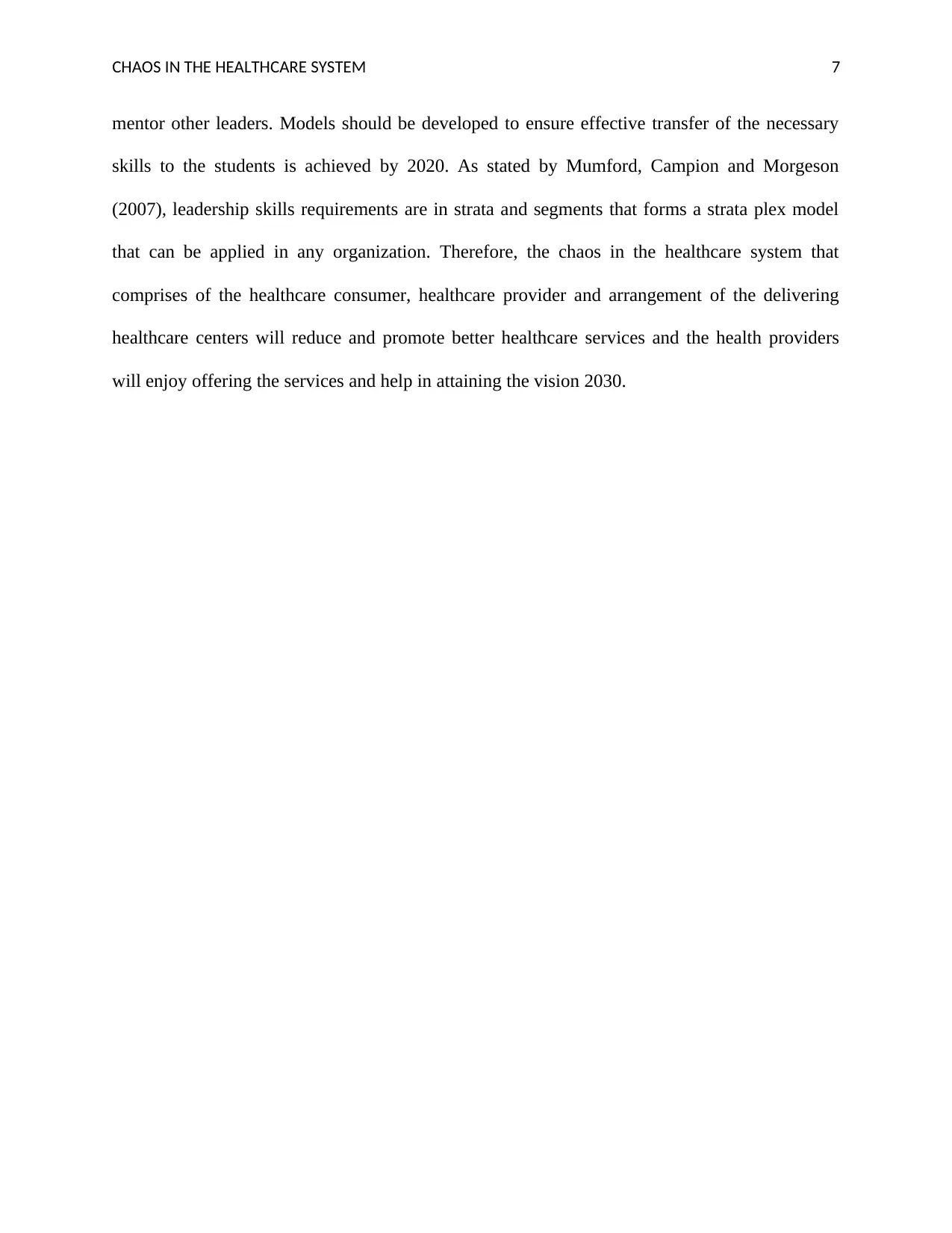
CHAOS IN THE HEALTHCARE SYSTEM 7
mentor other leaders. Models should be developed to ensure effective transfer of the necessary
skills to the students is achieved by 2020. As stated by Mumford, Campion and Morgeson
(2007), leadership skills requirements are in strata and segments that forms a strata plex model
that can be applied in any organization. Therefore, the chaos in the healthcare system that
comprises of the healthcare consumer, healthcare provider and arrangement of the delivering
healthcare centers will reduce and promote better healthcare services and the health providers
will enjoy offering the services and help in attaining the vision 2030.
mentor other leaders. Models should be developed to ensure effective transfer of the necessary
skills to the students is achieved by 2020. As stated by Mumford, Campion and Morgeson
(2007), leadership skills requirements are in strata and segments that forms a strata plex model
that can be applied in any organization. Therefore, the chaos in the healthcare system that
comprises of the healthcare consumer, healthcare provider and arrangement of the delivering
healthcare centers will reduce and promote better healthcare services and the health providers
will enjoy offering the services and help in attaining the vision 2030.
Paraphrase This Document
Need a fresh take? Get an instant paraphrase of this document with our AI Paraphraser
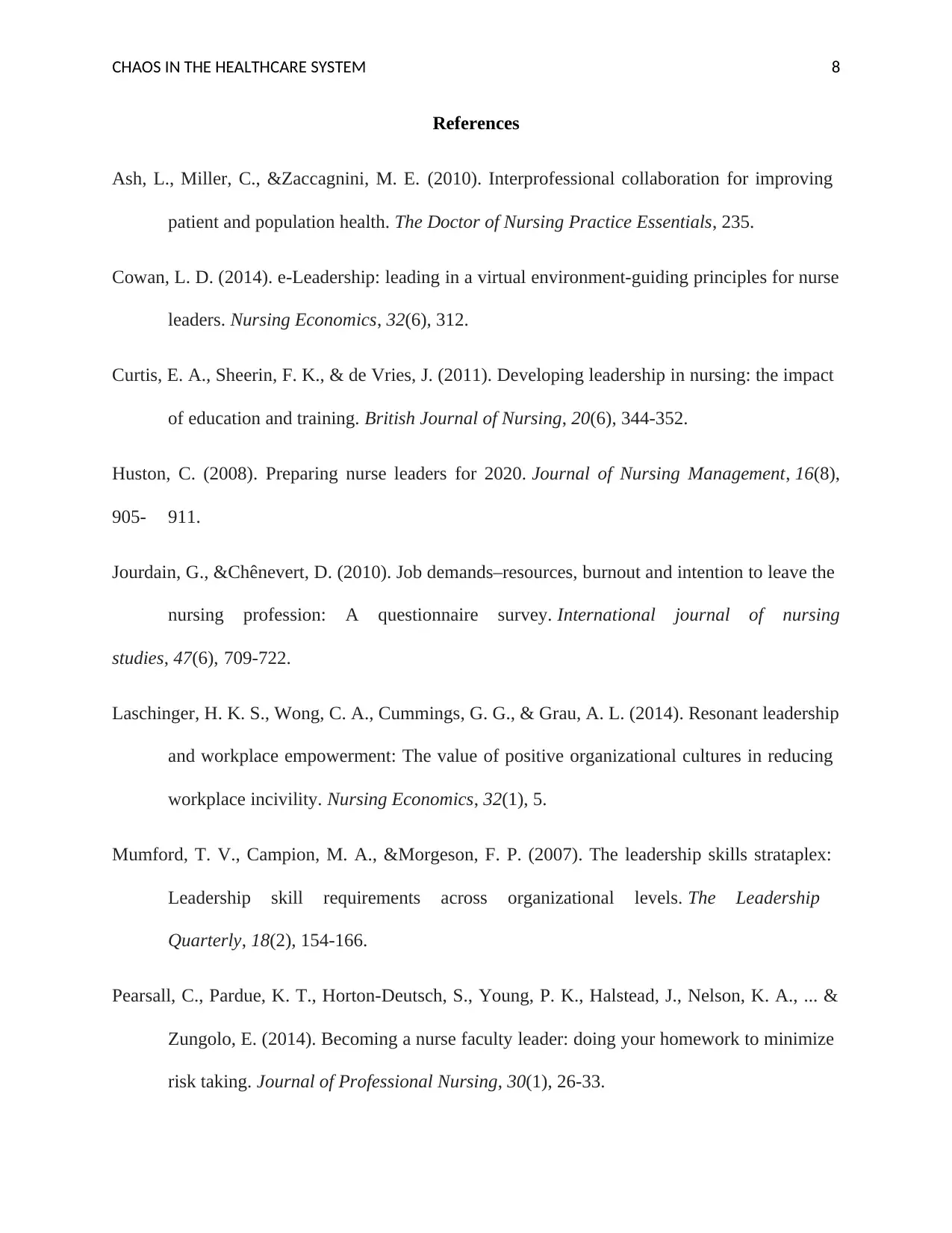
CHAOS IN THE HEALTHCARE SYSTEM 8
References
Ash, L., Miller, C., &Zaccagnini, M. E. (2010). Interprofessional collaboration for improving
patient and population health. The Doctor of Nursing Practice Essentials, 235.
Cowan, L. D. (2014). e-Leadership: leading in a virtual environment-guiding principles for nurse
leaders. Nursing Economics, 32(6), 312.
Curtis, E. A., Sheerin, F. K., & de Vries, J. (2011). Developing leadership in nursing: the impact
of education and training. British Journal of Nursing, 20(6), 344-352.
Huston, C. (2008). Preparing nurse leaders for 2020. Journal of Nursing Management, 16(8),
905- 911.
Jourdain, G., &Chênevert, D. (2010). Job demands–resources, burnout and intention to leave the
nursing profession: A questionnaire survey. International journal of nursing
studies, 47(6), 709-722.
Laschinger, H. K. S., Wong, C. A., Cummings, G. G., & Grau, A. L. (2014). Resonant leadership
and workplace empowerment: The value of positive organizational cultures in reducing
workplace incivility. Nursing Economics, 32(1), 5.
Mumford, T. V., Campion, M. A., &Morgeson, F. P. (2007). The leadership skills strataplex:
Leadership skill requirements across organizational levels. The Leadership
Quarterly, 18(2), 154-166.
Pearsall, C., Pardue, K. T., Horton-Deutsch, S., Young, P. K., Halstead, J., Nelson, K. A., ... &
Zungolo, E. (2014). Becoming a nurse faculty leader: doing your homework to minimize
risk taking. Journal of Professional Nursing, 30(1), 26-33.
References
Ash, L., Miller, C., &Zaccagnini, M. E. (2010). Interprofessional collaboration for improving
patient and population health. The Doctor of Nursing Practice Essentials, 235.
Cowan, L. D. (2014). e-Leadership: leading in a virtual environment-guiding principles for nurse
leaders. Nursing Economics, 32(6), 312.
Curtis, E. A., Sheerin, F. K., & de Vries, J. (2011). Developing leadership in nursing: the impact
of education and training. British Journal of Nursing, 20(6), 344-352.
Huston, C. (2008). Preparing nurse leaders for 2020. Journal of Nursing Management, 16(8),
905- 911.
Jourdain, G., &Chênevert, D. (2010). Job demands–resources, burnout and intention to leave the
nursing profession: A questionnaire survey. International journal of nursing
studies, 47(6), 709-722.
Laschinger, H. K. S., Wong, C. A., Cummings, G. G., & Grau, A. L. (2014). Resonant leadership
and workplace empowerment: The value of positive organizational cultures in reducing
workplace incivility. Nursing Economics, 32(1), 5.
Mumford, T. V., Campion, M. A., &Morgeson, F. P. (2007). The leadership skills strataplex:
Leadership skill requirements across organizational levels. The Leadership
Quarterly, 18(2), 154-166.
Pearsall, C., Pardue, K. T., Horton-Deutsch, S., Young, P. K., Halstead, J., Nelson, K. A., ... &
Zungolo, E. (2014). Becoming a nurse faculty leader: doing your homework to minimize
risk taking. Journal of Professional Nursing, 30(1), 26-33.
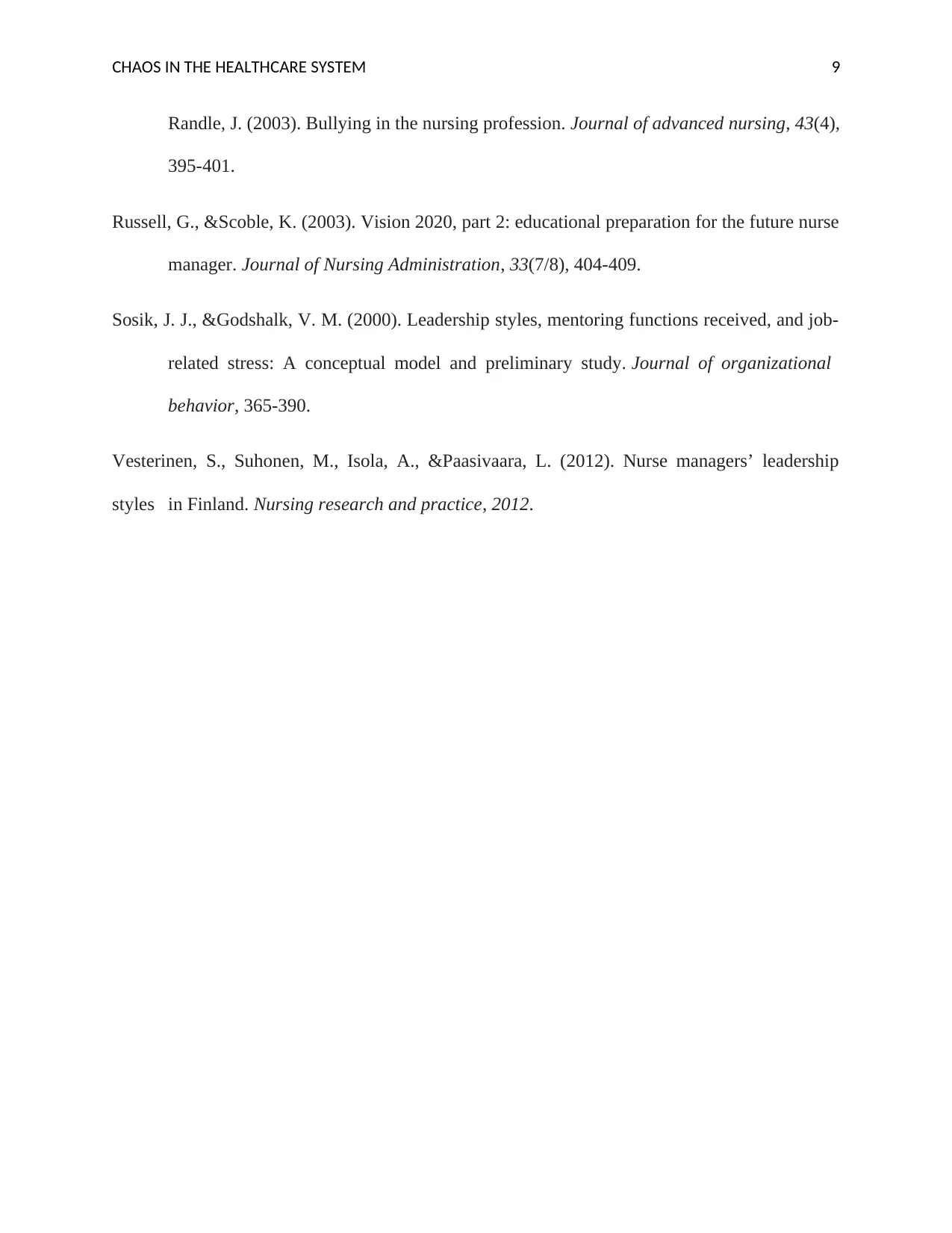
CHAOS IN THE HEALTHCARE SYSTEM 9
Randle, J. (2003). Bullying in the nursing profession. Journal of advanced nursing, 43(4),
395-401.
Russell, G., &Scoble, K. (2003). Vision 2020, part 2: educational preparation for the future nurse
manager. Journal of Nursing Administration, 33(7/8), 404-409.
Sosik, J. J., &Godshalk, V. M. (2000). Leadership styles, mentoring functions received, and job-
related stress: A conceptual model and preliminary study. Journal of organizational
behavior, 365-390.
Vesterinen, S., Suhonen, M., Isola, A., &Paasivaara, L. (2012). Nurse managers’ leadership
styles in Finland. Nursing research and practice, 2012.
Randle, J. (2003). Bullying in the nursing profession. Journal of advanced nursing, 43(4),
395-401.
Russell, G., &Scoble, K. (2003). Vision 2020, part 2: educational preparation for the future nurse
manager. Journal of Nursing Administration, 33(7/8), 404-409.
Sosik, J. J., &Godshalk, V. M. (2000). Leadership styles, mentoring functions received, and job-
related stress: A conceptual model and preliminary study. Journal of organizational
behavior, 365-390.
Vesterinen, S., Suhonen, M., Isola, A., &Paasivaara, L. (2012). Nurse managers’ leadership
styles in Finland. Nursing research and practice, 2012.
1 out of 9
Related Documents
Your All-in-One AI-Powered Toolkit for Academic Success.
+13062052269
info@desklib.com
Available 24*7 on WhatsApp / Email
![[object Object]](/_next/static/media/star-bottom.7253800d.svg)
Unlock your academic potential
© 2024 | Zucol Services PVT LTD | All rights reserved.





